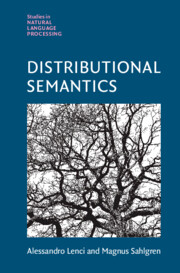7 - Evaluation of Distributional Semantic Models
from Part III - Practice
Published online by Cambridge University Press: 07 September 2023
Summary
This chapter focuses on the evaluation of distributional semantic models (DSMs). Distributional semantics has usually favored intrinsic methods that test DSMs for their ability to model various kinds of semantic similarity and relatedness. Recently, extrinsic evaluation has also become very popular: the distributional vectors are fed into a downstream NLP task and are evaluated with the system’s performance. The goal of this chapter is twofold: (i) to present the most common evaluation methods in distributional semantics, and (ii) to carry out a large-scale comparison between the static DSMs reviewed in Part II. First, we discuss the notion of semantic similarity, which is central in distributional semantics. Then, we present the major tasks for intrinsic and extrinsic evaluation, and we analyze the performance of a representative group of static DSMs on several semantic tasks. Finally, we explore the differences of the semantic spaces produced by these models with Representational Similarity Analysis.
Information
- Type
- Chapter
- Information
- Distributional Semantics , pp. 171 - 212Publisher: Cambridge University PressPrint publication year: 2023
